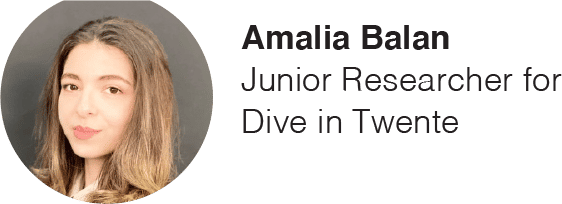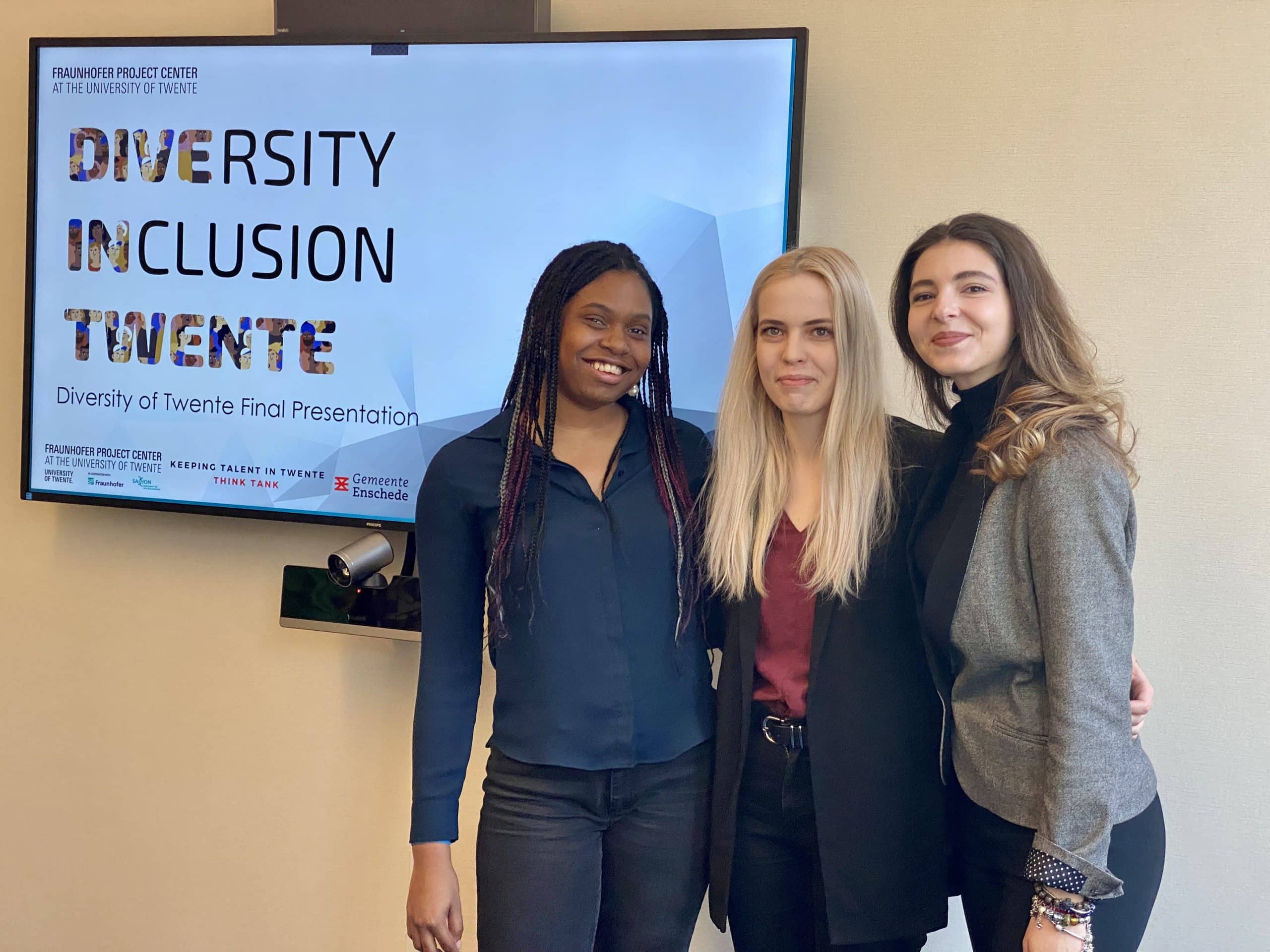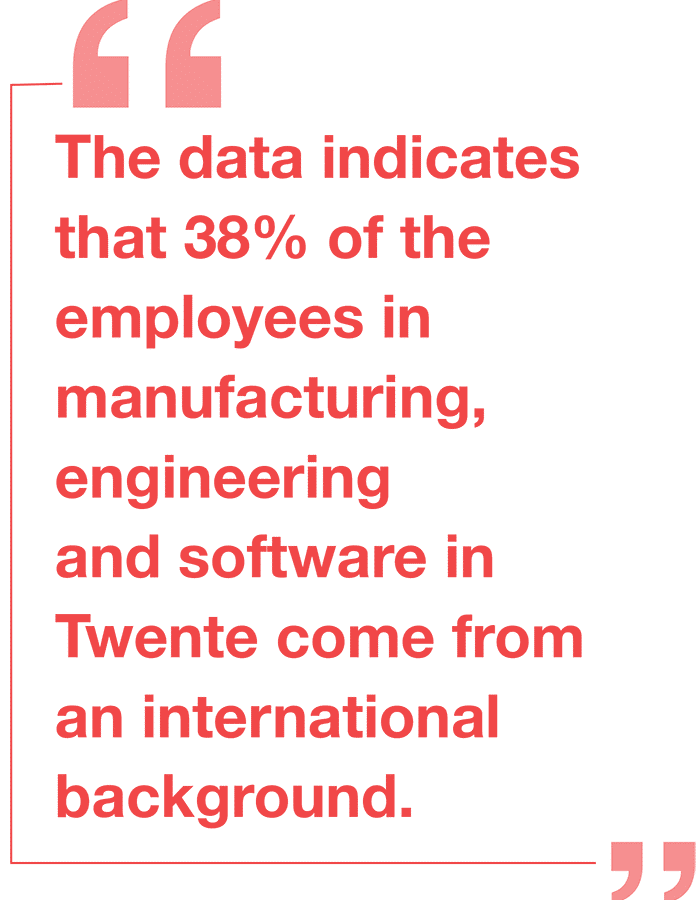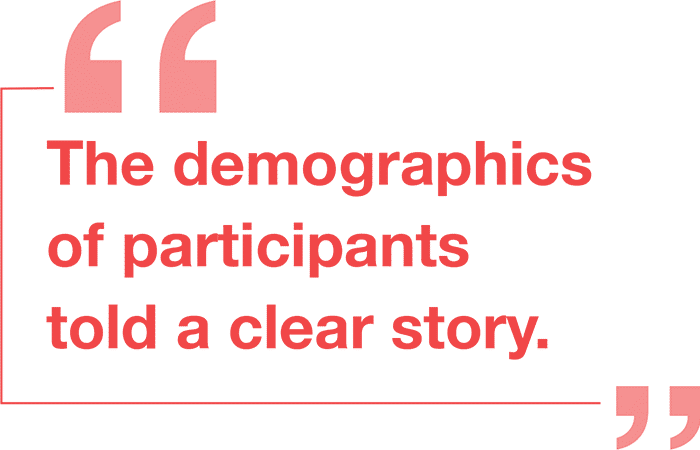DIVE IN TWENTE

The student team of Fraunhofer Innovation Platform for Advanced Manufacturing have undertaken a research project, proposed and financed by Gemeente Enschede, Twente Board, University of Twente, Fraunhofer Innovation Platform (FIP) and Keeping Talent in Twente (KTIT). It aims to explore the topic of diversity and inclusion in the workforce in the Twente area, focusing on manufacturing, engineering and software companies from the region. Members of the junior research team are Amalia Balan (Master Student of Communication Science) from Romania, Carithea Richard (Master Student of Industrial Design Engineering) originally from Jamaica, and Daria Lungu (Master Student of Business Administration) from Romania.

Dive in Twente, as the project name suggests, required the research team to identify current diversity levels, measure the target group’s attitudes and beliefs about social phenomena and most importantly, interactively devise best practices in how to inform, coach and persuade companies to increase their diversity and inclusion levels.
The objectives of the project were investigated by the main research question: “What are the differences in attitudes towards employment diversity of manufacturing companies in the Twente area in 2021- 2022?” This question was the driver of the study for over 9 months.
According to University of Twente statistics, during the 2021-22 period, over 12,000 talented young students commenced their studies within the educational institution, with 32% of them coming from abroad. It is relevant to mention that prior to this research, no scientific papers or studies had been conducted on the topics of diversity and inclusion of the workforces of manufacturing, engineering, and software companies in the Twente area.
According to statistics, there is an increasing number of current local employees who are on the point of retiring. This has created a high demand for new, young employees to fill the vacancies left by retirees. What do regional companies do to facilitate the hiring of young talent? How do they expand industries and encourage the development of communities?
The ongoing transition to a more technological base within the industry comes with challenges that could, perhaps, be best addressed by a more youthful workforce, who are more tech savvy, more attuned to change, and because they are less set in the ‘old way of doing things’, are more adaptable.
Only 3.6% of the people who work in the Twente area have a different culture. Our research was able to shed light on current diversity readiness in local companies and devise a set of ‘best practices’ for each stage, with an emphasis on the challenges presented by the ‘attraction’ and ‘retention’ stages.

The collecting of data for research purposes was conducted by the Research Team in two phases. Firstly, we compiled a list of all manufacturing, engineering and software companies in the Twente region, comprising 90 companies. In the first data collection phase, six companies were chosen at random, and were each invited to a forty-five minute interview. Our goal was to explore, in depth, each company’s experience with diversity and inclusion, gathering as much information as we could elicit. Based on the data we collected and the resulting analysis, the research team created a template for the second data collection phase. This was in the form of a survey which aimed to collect opinions from the remaining companies, asking them about common aspects framed by participants in the interview session and also examine unique viewpoints. In total, over a third of the companies from the region took part in this research.
Key findings of the research indicate that manufacturing, engineering and software companies from the Twente region are reasonably diverse in many aspects and not at all diverse in others. Surprisingly, over 63% of the participants in the study claim that the main spoken language in their company is English, which is a solid indication that businesses are embracing international norms. It also exhibits a willingness to make foreign workers feel included in the work environment and facilitates an atmosphere of inclusiveness within teams. In this portion of the research, it appears the companies are diverse.
However, language was not the only focus of this study. Diversity is a broad topic and this research also focused on gender, ethnicity and age elements. The data indicates that 38% of the employees in manufacturing, engineering and software in Twente come from an international background. Additionally, the female representation in the manufacturing, engineering, and software companies from the region was 24%, and the male representation was registered to be 76%.

No company involved in this project had a Diversity Officer in their organization. To be more precise, when participants were asked, “Who is responsible for integrating international new hires?” in 30% of cases, the HR department was mentioned as taking the lead. Unfortunately, the second most common answer was ‘no-one’.
The demographics of participants told a clear story. Their job titles were CEO, Director, HR Managers. 19% of them are EU citizens, 81% are Dutch citizens and there was not even one participant from a non-EU country. Internationalization is represented only by EU citizens.
To sum up the findings; a considerable number of participants disagreed with the statement “My work-place is very diverse in terms of gender.” When asked their feelings on the statement, “My management team is diverse in terms of gender”, the most common answer was “I disagree.” When similar questions were asked about the international aspect of the management team, the answers again registered “disagree” as the most common response.
These findings were deliverables of this projects, specifically an academic paper, a board game, and a tool kit, designed to facilitate and trigger open discussion within regional companies, teaching them how to level up their current diversity levels. We have compiled the most interesting insights into our list of best practices which were unearthed by our study. These are included in a booklet especially designed to offer guidance for companies by informing them and coaching them to the most appropriate and practical solutions for their individual needs.
Dive in Twente is an invitation to get inspired, to enhance and improve your working culture by becoming a ‘local ambassador’ for our region.
